
by Mama B (Saudi Arabia) | Feb 25, 2015 | 2015, Government, Grief, Media, Saudi Arabia, Uncategorized, World Events, World Motherhood
 Early in the evening, we heard that he was not doing well. Then again, as is the way here, we had been hearing a great many things since the king had entered the hospital. Although Riyadh, the capital city of Saudi, has a population of four million, it still functions like a little neighborhood. Everyone has a ‘reliable source’ on the inside. As a rule, I do not believe anything until it is officially on the news–and even then, I take it with a grain of salt. Nonetheless, it was hardly a surprise when, at 2:00 AM, Saudi Arabian television announced the death of King Abdullah bin Abdulaziz Al-Saud at the age of 90. Even though I expected the news, it broke my heart.
Early in the evening, we heard that he was not doing well. Then again, as is the way here, we had been hearing a great many things since the king had entered the hospital. Although Riyadh, the capital city of Saudi, has a population of four million, it still functions like a little neighborhood. Everyone has a ‘reliable source’ on the inside. As a rule, I do not believe anything until it is officially on the news–and even then, I take it with a grain of salt. Nonetheless, it was hardly a surprise when, at 2:00 AM, Saudi Arabian television announced the death of King Abdullah bin Abdulaziz Al-Saud at the age of 90. Even though I expected the news, it broke my heart.
I watched the local Saudi channel for a while, then I switched, curious to see how the foreign press would frame the news. They appeared to be competing to see who could be the most negative about Saudi Arabia’s progress under King Abdullah’s reign. Although their own experts pointed to the king’s many accomplishments, the foreign networks seemed to delight in ignoring them and focusing on the dissidents. Reporter after reporter repeated that progress in Saudi was occurring at a ‘glacial rate.’
The western media used its standard to measure my country’s progress.
Maybe they assumed that their standard is the one all the world should aspire to? They ignored how different Saudi is in our priorities, life style, and even our wants and needs. They ignored how young a country we are, and they certainly did not measure how far we have come.
By the morning we had a new king. No bloodshed, no chaos, no ‘state of emergency’, no transitional government. We have come far under King Abdullah’s reign. Yes, Saudis do recognize our shortcomings, and, yes, we do want to–and will–improve. But we should, and will, recognize and celebrate our accomplishments along the way.
We must be doing something right, as we are the most stable country in the region. We are battling the Houthis in the south, ISIS in the north, and successfully fighting terrorism on our own soil, all while growing our universities and health care system. In the past decade, women have been elected to the Shura Council, which advises the king. Twenty-eight universities were built. Two hundred thousand students were given scholarships to universities overseas. Six medical cities were built, 11 specialist hospitals were built, and 32 general hospitals were built. Finally, as a woman in Saudi Arabia, I seen both an expansion of the opportunities I have in my own life, and in the paths that are being laid for my daughter’s future, which far exceed anything available to me when I was her age.
For days after King Abdullah’s death, I could not stop crying. I watched my country mourn on the streets around Saudi. It was as if we had lost our own father. He was so beloved that people who were not related to him, who had never even seen him in the flesh, were giving each other condolences on his loss. His life fulfilled the adage, “When you are born, you cry and the world rejoices. Live your life so that when you die, you rejoice and the word cries.”
Picture attributed to Edward Musiak and used under a Flickr Creative Commons License.

Mama B’s a young mother of four beautiful children who leave her speechless in both, good ways and bad. She has been married for 9 years and has lived in London twice in her life. The first time was before marriage (for 4 years) and then again after marriage and kid number 2 (for almost 2 years). She is settled now in Riyadh, Saudi Arabia (or as settled as one can be while renovating a house).
Mama B loves writing and has been doing it since she could pick up a crayon. Then, for reasons beyond her comprehension, she did not study to become a writer, but instead took graphic design courses. Mama B writes about the challenges of raising children in this world, as it is, who are happy, confident, self reliant and productive without driving them (or herself) insane in the process.
Mama B also sheds some light on the life of Saudi, Muslim children but does not claim to be the voice of all mothers or children in Saudi. Just her little "tribe." She has a huge, beautiful, loving family of brothers and sisters that make her feel like she wants to give her kids a huge, loving family of brothers and sisters, but then is snapped out of it by one of her three monkeys screaming “Ya Maamaa” (Ya being the arabic word for ‘hey’). You can find Mama B writing at her blog, Ya Maamaa . She's also on Twitter @YaMaamaa.
More Posts

by Kyla P'an (Portugal) | Nov 21, 2014 | 2014, Adolescence, Awareness, Childhood, Girl Child, Girls, Kids, Life, Life Lesson, Media, Milestones, Motherhood, Older Children, Parenting, Puberty, Teenagers, World Motherhood, Youth
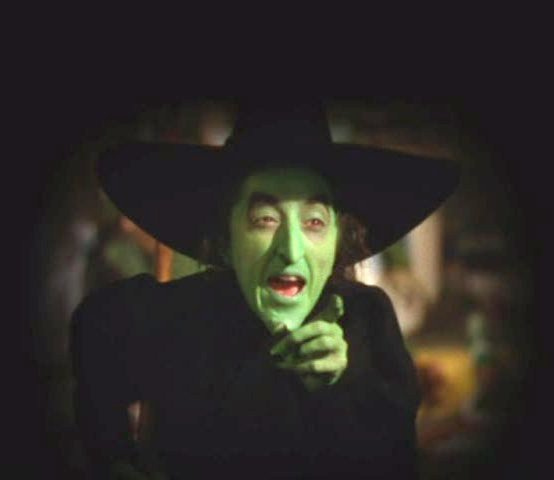
The Wicked Witch of the West
Eight years ago I had my first child, a daughter. Like most new parents, I got all sorts of advice and did a great deal of information gathering; particularly on those uncharted, early stages of infancy and babyhood.
I knew it was possible my child would have colic, GERD, and rashes. I had heard about the “terrible twos” and the “trying threes.” I was fortified for long days and short nights, especially during the early years. And I knew having a child home to entertain and educate for five years would be a whole different challenge from my professional life.
But, I thought I was ready because I knew—at the end of a long, sometimes dark, tunnel—there would be kindergarten, followed by the blissful and innocent days of elementary school to put me back on track. I anticipated that from age 5-11, life would be pretty seamless. Five years of struggle followed by at least six of predictability before the challenges of the teenage years moved in.
So when our daughter entered kindergarten three years ago, my husband and I settled in for the “predictable” parenting years we were expecting.
Sadly—and far too soon—those years are coming to a close…
This past summer, we got glimpses of something we had heard about but weren’t prepared for just yet: moodiness, sassy attitude, changes in speaking style, exploration of identity, greater awareness of appearance and increased self-consciousness.
Now that 3rd-grade is in full-swing, those glimpses are becoming the norm. It’s fairly clear that we are entering a new stage of parenting: we’re entering the TWEENS.
“Tween” is a term we use here in the US to describe the pre-teen stage of life. It’s in-between being a sweet, young kid, who’s dependent on parents and family for every aspect of life, and puberty, when a child morphs into a sassy, experimenting, independent teenager, stomping off toward adulthood.
The Tweens is a stage of life—I think populated almost exclusively by girls—when kids try to propel themselves prematurely into their next growth phase. They test out language they pick up from older kids, through pop-music and from movies and television. They mimic styles they see in the media. They use vernacular such as “like” and “whatever” and “no way!” They gravitate almost exclusively to their own gender groups.
And despite even the best attempts to shield children from pop culture and the negative influences present on TV, they still somehow find their fix at school.
The tweens are a funny, little limbo-land.
Take our daughter for example: She’s still afraid of the dark (in fact, she’s fairly convinced the Wicked Witch from the Wizard of Oz is living in her closet); her favorite Disney character is Sofia the First; she loves kittens and rainbows, unicorns and stuffed animals. But recently, she also has discovered Disney’s High School Musical, and when we go to our pediatrician’s office, she pours over the book, It’s Perfectly Normal, (she has a lot of questions about both).
These days, she prone to emotional outbursts, demanding “alone” time and spontaneous moments of being shy. Aren’t these teenager behaviors?
Tonight, while my five-year-old was in a martial arts class, my daughter and I sat in the car having a chat. She said she was sad because she felt frustrated and sort of out of control. I found myself explaining puberty to her and talking about hormones and endorphins and lots of other changes in our bodies that made us feel confused and out of sorts…Uh, did I mention she’s only 8?
According to the American Academy of Pediatrics, the onset of puberty in girls now happens as young as 7! OK, so none of my early parenthood prep or information gathering or family planning ever involved needing to have these conversations so soon. Afterall, my youngest just started kindergarten. By my accounts, I had just come out of the trenches. I’m not battle ready. I don’t have my armor on. This is going to be a massacre!
But this is where we are these days…the in-beTWEENS. Wish us luck.
Have you experienced these sorts of changes in your own child(ren)? If so, at what age? Any advice for getting through to the other side?
This is an original post to World Moms Blog from our managing editor and mother of two (one of whom is entering her tweens), Kyla P’an.
The image used in this post is credited to Karen. It holds a Flickr Creative Commons attribution license.
Kyla was born in suburban Philadelphia but spent most of her time growing up in New England. She took her first big, solo-trip at age 14, when she traveled to visit a friend on a small Greek island. Since then, travels have included: three months on the European rails, three years studying and working in Japan, and nine months taking the slow route back from Japan to the US when she was done. In addition to her work as Managing Editor of World Moms Network, Kyla is a freelance writer, copy editor, recovering triathlete and occasional blogger. Until recently, she and her husband resided outside of Boston, Massachusetts, where they were raising two spunky kids, two frisky cats, a snail, a fish and a snake. They now live outside of Lisbon, Portugal with two spunky teens and three frisky cats. You can read more about Kyla’s outlook on the world and parenting on her personal blogs, Growing Muses And Muses Where We Go
More Posts - Website
Follow Me:

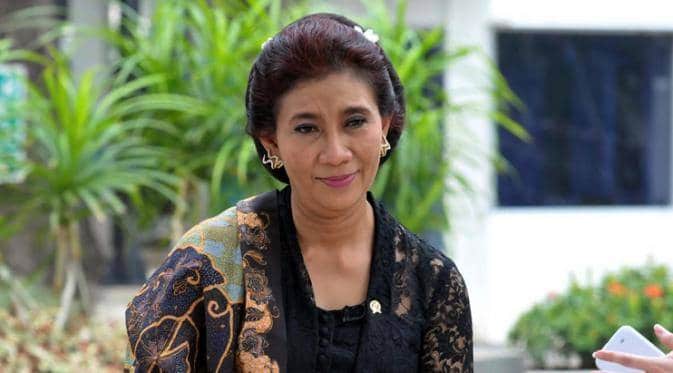
by Maureen | Nov 20, 2014 | 2014, Awareness, Being Thankful, Elections, Eye on Culture, Feminism, Government, Indonesia, Inspirational, Media, News, Politics, Prejudice, Respect, Scoops of Joy, Women's Rights, World Motherhood

Susi Pudjiastuti, Minister of Maritime and Fisheries
Big changes are taking place in Indonesia lately with the new President Joko Widodo (or as we Indonesians lovingly call him, Jokowi) taking office last month.
Six days after he took office, Jokowi announced his cabinet lineup to the public. Eight women out of a total of 34 have been elected as ministers. It was the highest number of female cabinet ministers that has ever been elected in our country’s history and demonstrates Jokowi’s courage in giving women an opportunity.
Gender equality opportunity seems to have a brighter future with this cabinet lineup.
One of the women ministers that has been elected is Susi Pudjiastuti. She was elected as Minister of Maritime and Fisheries.
The media have been talking about Susi all of a sudden. She even became a trending topic on Twitter. Her election as a minister created a big controversy here.
She was not someone that came from any political affiliate. She is a bit different compared with some other women in world politics, like Hillary Clinton or Angela Merkel; she is a business woman. She smokes, she doesn’t have a PhD or any prestigious titles lined up behind her name – she actually dropped out of high school and unlike some others, she didn’t drop out of school because she was poor, it was actually because she felt she wasn’t happy even when she was reportedly a bright student. She decided to follow her own path at the tender age of 17.
With roughly $75, she started her first entrepreneurship in Pangandaran, Central Java with a fishery business. In 1996 she formed her own company called PT. ASI Pudjiastuti Marine Product. After her business expanded throughout Asia and America, she realized she needed a fast and reliable way to transport the seafood products to the buyers. Then Susi Air was born. She built her own aviation company even obtaining her own pilot license. Her airline now serves publicly in many remote parts of Indonesia.
Sadly, the media coverage she received was not because of her achievements or the many awards she has received over the years. The media coverage arose because she has tattoos, because she smokes, is a social drinker and a single mom, formerly married to Caucasian men twice.
Her detractors started judging her personal life, discrediting her ability to hold her role as a minister while she jumped head first into her new job in the government and making the necessary changes.
Among the negative comments however there also has been a lot of support for Susi. I am one of those big supporters.
In my eyes, I see a strong woman, someone very capable and who seems to have a strong character and is very intelligent despite her lack of a college education. Being a successful, independent single mother will really inspire other single mothers in Indonesia. We now have the first single mother minister in the history of Indonesia.
For the Indonesian patriarchy system, this feels like a big breakthrough and already she is busy working hard to fix the maritime and fisheries industry. Jokowi believes in her and that she has what it takes to get the job done and to create breakthroughs.
Jokowi is leading the way by giving Susi Pudjiastuti and the rest of the women minister an opportunity to take important roles in the government.
I salute all of these women and wish them all the best in their new roles.
There are many women involved in politics worldwide these days. Do any female politicians inspire you? What do you think of the increased number of women’s involved in politics?
This is an original post to World Moms Blog from our writer and mother of one in Indonesia, Maureen.
The image used in this post is from Susi Pudjiastuti’s public Facebook page. You can view more images of the politician here.

by Sophie Walker (UK) | Oct 27, 2014 | Africa, Journalism, Media, News, Priorities, Sophie Walker, UK
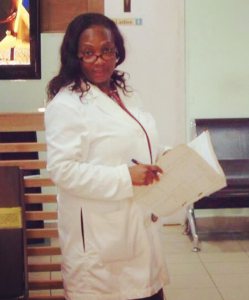 Do you know who Dr Stella Ameyo Adadevoh is?
Do you know who Dr Stella Ameyo Adadevoh is?
Don’t worry. I hadn’t heard of her until just a day or two ago.
When I read about her, my first thought was how wonderful she was. My second was how glad I was of the opportunity to find out about her. My third: what a strange week of news.
It’s largely thanks to Dr Stella Ameyo Adadevoh that the World Health Organisation was able to announce recently that Nigeria – that chaotic, corruption-riddled country – was free of Ebola, the deadly virus currently killing thousands across west Africa in the worst outbreak of the disease known so far.
Dr Adadevoh was the doctor who took care of Patrick Sawyer. Sawyer was the Liberian man who brought Ebola to Nigeria. Nigeria had never had a case of Ebola before. Sawyer denied having had any contact with Ebola, despite his sister dying of the disease. He fought to get out of the hospital. His employers fought to have him discharged.
Adadevoh not only diagnosed a disease previously unseen in her country, but she resisted huge pressure to let it go, according to accounts from the doctors who worked with her.
She quarantined Sawyer – no small task, given his violent attempt to flee – “He pulled his intravenous (tubes) and spilled blood everywhere”, said one witness. She rebutted accusations from the Liberian ambassador that she had kidnapped Sawyer. She contacted the authorities, and she got hospital staff the training and materials they needed to treat Sawyer safely.
Sadly Adadevoh herself contracted the virus and died on August 19, one of eight deaths in Nigeria from Ebola. Not long afterwards the Nigerian government released its National Honours list for this year. Adadevoh was not on it because, as a government spokesman explained, the awards are never given posthumously.
I’ve seen two stories this week about Dr Stella Adadevoh. She did a great thing, and died for it, and too few people noticed.
In contrast, I’ve seen at least twenty-two stories this week about Rene Zellweger, an actress who changed her face and prompted acres – and acres – of media coverage.
I have nothing against Zellweger. Indeed, I have a degree of (angry) sympathy. I recognise the pressure on actresses over forty who are looking for work.
But what a strange week of news, when a woman who has done so much was unseen by so many, and another woman was not just seen but ripped apart for being far too visible.
I’m a journalist by trade. I accept that much of this disparity is down to skewed ideas among major media outlets of what makes news.
But we too – by we I mean us women – bear a responsibility for the way in which women’s lives and achievements are reported. Too often we read and comment on the scandalous stories. Too often we’re boosting the click rates and thus telling those media outlets that yes we are interested in reading this stuff. We are perpetuating the myth that it’s ok to pass judgment on other women purely because of the way they look. We are contributing to the noise around the non-stories that is stopping us from hearing the real ones.
I want to read about more Stellas. Don’t you?
This is an original post to World Moms Blog by Sophie Walker of the United Kingdom.

Writer, mother, runner: Sophie works for an international news agency and has written about economics, politics, trade, war, diplomacy and finance from datelines as diverse as Paris, Washington, Hong Kong, Kabul, Baghdad and Islamabad. She now lives in London with her husband, two daughters and two step-sons.
Sophie's elder daughter Grace was diagnosed with Asperger Syndrome several years ago. Grace is a bright, artistic girl who nonetheless struggles to fit into a world she often finds hard to understand. Sophie and Grace have come across great kindness but more often been shocked by how little people know and understand about autism and by how difficult it is to get Grace the help she needs.
Sophie writes about Grace’s daily challenges, and those of the grueling training regimes she sets herself to run long-distance events in order to raise awareness and funds for Britain’s National Autistic Society so that Grace and children like her can blossom. Her book "Grace Under Pressure: Going The Distance as an Asperger's Mum" was published by Little, Brown (Piatkus) in 2012. Her blog is called Grace Under Pressure.
More Posts

by World Moms Blog | Oct 22, 2014 | 2014, Africa, Awareness, Being Thankful, Caring, Casting a Wider Net, Communication, Economy, Education, Girls, Government, Guest Post, Helping, Human Rights, Humanitarian, Humanity, Inspirational, International, Life, Loss of Child, Media, Motherhood, Nigeria, Older Children, Poverty, Prejudice, Relationships, Safety, School, Social Equality, Terrorism, Tragedy, Women's Rights, Working Mother, World Mom Feature, World Motherhood, World Voice
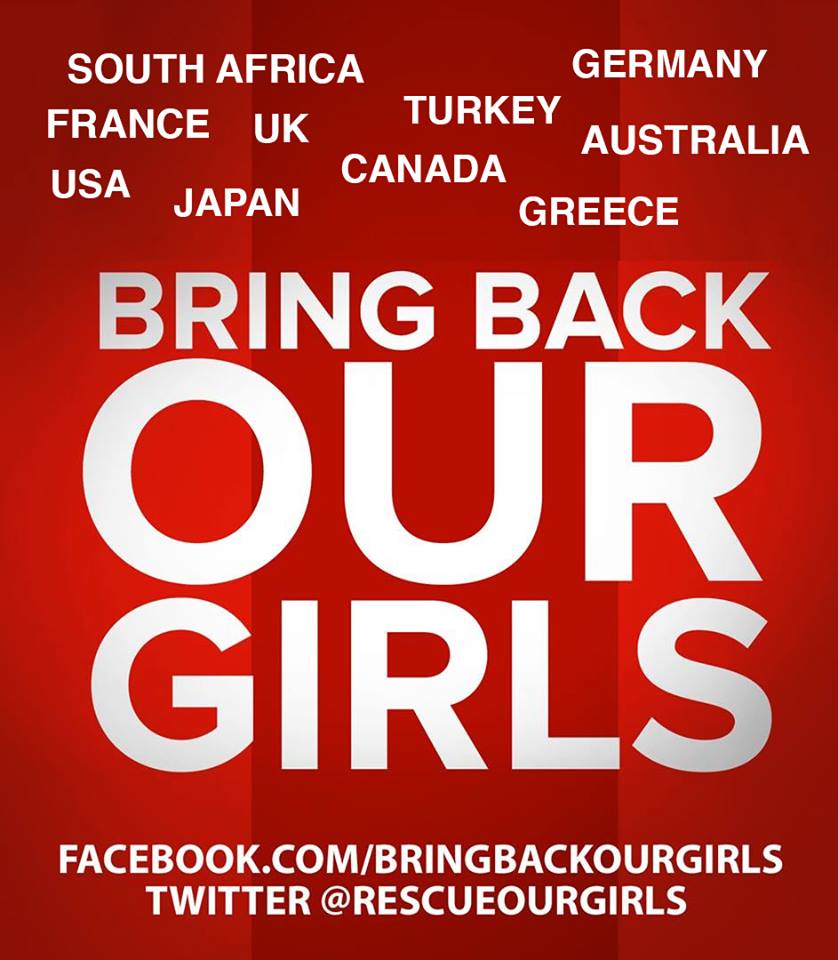 “My daughter said she was going to go to school so that she can wipe away my tears. How is she wiping my tears away in the den of the terrorists?”
“My daughter said she was going to go to school so that she can wipe away my tears. How is she wiping my tears away in the den of the terrorists?”
-mother of one of the #ChibokGirls, abducted on April 14th, 2014, speaking on Day 188 of their abduction -October 19th, 2014
As I looked at her I realized that all this woman’s hopes and aspirations rest on her daughter. For most of the poor people in this part of the world, children are like a source of pension; they are the ones that will help you in the future. They are the ones that will take care of you in your old age, when you are unable to look after yourself. They represent life. As I looked at her I also realized that her daughter means more to her than I can ever imagine. Her daughter is her everything. A source of hope.
These parents are ready to give their lives for their children to have an education. That was what the #ChibokParents did. Amidst the insecurity in Nigeria, they still wanted their children to be educated to better their positions in life. They knew the only way to break the shackles of poverty was through education. For daring to send their children to school to have a better life, instead they have been punished.
These children grow up to not only take care of their parents but siblings as well so that a generation of people who have survived the shackles of poverty would emerge.
For some, poverty is going to school in the morning without breakfast and returning home not expecting lunch but still striving everyday to be in school so that one day you will look back and say I SURVIVED (I AM A SURVIVOR).
I remember one of the fathers at one of our Sit Ins for the #BringbackOurGirls campaign—which started on April 30th with a protest demanding for the rescue of #ChibokGirls—saying he does not have a Television. All he has is a Radio from which he gets to hear of our activities. I wept! In this day of iPads, Tablets, iPhones and what have you, someone does not have a simple television that most of us take for granted.
So now you can begin to understand that to the #ChibokParents these girls are much more than daughters, they are future benefactors
A lot of parents, especially mothers, are forced to live a life of servitude and poverty in order for their children to be educated. The education that is taken for granted in most developed countries is not so in Nigeria and many other African countries.
I remember growing up and how my parents had to struggle to make sure we were educated. We often had to go without food when the situation grew dire but never were my school fees unpaid. I remember my father trekking long distance to buy a textbook I needed badly because the money was not enough for him to pay for a bus. All the suffering was for the children to be able to break the vicious cycle of poverty and one day to be able to take care of ourselves and also take care of our parents and siblings.
A lot of parents invest all they have in their children. For those who are poor, they do not have cars, houses or any investments. All they have are their children. Can you imagine these children being abducted, as is the case with the #ChibokGirls, abducted from school, where they wanted to get an education and make life better for themselves and their families? When these children of the poor are abducted and taken away, the future of a whole generation also is taken away.
As I looked at the woman with tears streaming down her face, all I could see was my own mum, who had to be the head-of-household, who worked all day and night to ensure I had an education. I look back to the days when there was no food to be eaten and yet we found our way to school. I thought of what a burden it must have been for my parents to get us educated, to sacrifice all that they had.
While some of my parent’s contemporaries were busy enjoying life in the way they could with what they had, my parents tightened their belt to make sure that we, their children, had an education and of course today we are their pension. If any of us had been abducted while seeking an education, where would we be today?
As I stood watching the Chibok mother, all I could think about was my mother struggling to give her children the life she did not have and how hard she worked to provide that for us. I thought of my mother, now living in the lap of luxury because she worked so hard four sake. As I stood looking at the Chibok Mother, I realized she too must be allowed to break the shackles of poverty. She too must live in comfort, as her daughter promised her. Her tears must be wiped away. As I stood looking at her I realized that I cannot stop demanding for the rescue of the #ChibokGirls, for that Chibok mother who has given her all, hoping that one day her tears would be wiped away.
I realized that I must demand the rescue of the Chibok girls.We all must.
Demanding the safe return of the Chibok girls to me is like making a demand for the ME that was 23 years ago. As I stood I realized that no matter how hard it gets, no matter how much we are intimidated and harassed, no matter the threat of arrest from our government, I cannot afford to give up on the #ChibokGirls.
To give up on the #ChibokGirls is to give up on myself (the WHO that I have become) and to give up on the mother with tears streaming down her face, waiting for her daughter, who promised to wipe away her tears.
This is an original, Guest Post for World Moms Blog from our sister in Nigeria and mother of two, Aisha Yesufu.
Aisha Yesufu was born in Kano, Nigeria. When she turned 40, in December 2013, she decided it was time to devote her life fully to the services of others. As she describes it,
‘The first 40 years of my life I devoted to myself, so I could be financially independent and help others. But they say: you can’t help the poor by being poor yourself, so the next 40 years, God willing, I am going to devote to others; for me, a full life will be based on what positive differences I have made in the life of another.”
And in came the unfortunate tragedy of the abduction of the #ChibokGirls. Following their abduction, on April 14th 2014, Aisha joined a group of like minded people to demand the rescue of the 219 school girls, who still today remain in the hands of the terrorists. These girls, between the ages of 16 to 18, were abducted from their school, in their quest for knowledge. The group known as the #Bring Back Our Girls campaign has been able to push the issue of their rescue in public discussion both locally and internationally.
Aisha is the coordinator of the daily Sit In for the #BringBackOurGirls campaign group. The group has, without fail, come out daily since the 30th of April, 2014, despite all forms of intimidations and harassment by sponsored persons.
To get involved in the conversation and learn more about the plight of the 219 Nigerian School Girls, visit: #BringBackOurGilrs
World Moms Blog is an award winning website which writes from over 30 countries on the topics of motherhood, culture, human rights and social good. Over 70 international contributors share their stories from around the globe, bonded by the common thread of motherhood and wanting a better world for their children.
World Moms Blog was listed by Forbes Woman as one of the "Best 100 Websites for Women 2012 & 2013" and also called a "must read" by the NY Times Motherlode in 2013. Our Senior Editor in India, Purnima Ramakrishnan, was awarded the BlogHer International Activist Award in 2013.
More Posts

by Susie Newday (Israel) | Jun 18, 2014 | 2014, Awareness, Guest Post, Israel, Kids, Media, Motherhood, Parenting, Safety, Terrorism, World Voice
Below is a guest post by Joanna Landau, the founder of Kinetis. I turned to her when I was struggling to write a post about 3 teenagers kidnapped in Israel by terrorists. I knew I wanted to bring attention to the situation because I have been appalled at the lack of press this situation was getting around the world. Fellow World Moms confirmed for me that in their respective countries, the news was getting close to no coverage and in many instances, no coverage at all. Yet here in Israel, no one has thought about anything else for the past 6 days. Joanna has managed to capture all my thoughts and feelings. Please share her message.
The phone rings. “Hey, Mom, it’s me”, your 16 year old son says, “I’m on my way home”. You put the phone down, and go back to whatever it is you’re doing. An hour later, you start to worry, he’s not answering his phone. Two hours later you and your husband start to panic, you call friends, relatives, start canvassing the neighborhood. Three, four, five hours later, you know something’s happened. And then you realize you’ve joined that awful statistic, something’s happened. Turns out your son hitchhiked his way home with a couple of friends, and has been kidnapped. Your worst fears have come true. And now what? What would you do to bring him back, assuming the police are doing everything they can to find him?
There’s a boy called Naftali, and he was kidnapped together with his friends Gilad and Eyal 6 days ago. Naftali called his mother, a half an hour before he got into the car.
This is not a hypothetical situation. It happened in Israel and you may have not heard of it, because it sounds like the kind of thing that can happen in a place where there’s a conflict going on.
And some may put a political twist on it, bringing in all sorts of issues that can cloud the basic, simple fact that three youngsters have been kidnapped.
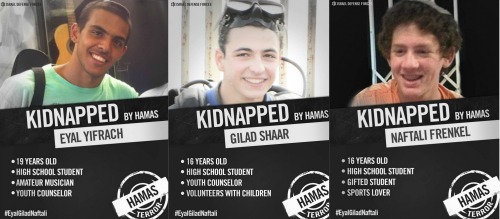
In Israel it’s the only thing on our mind, as a nation fears for three kids, not soldiers, who have disappeared, apparently taken by terrorists. But it’s not a political story: for every mother, wherever you live, it’s a personal story. Because these things can happen anywhere, and children and teens have become innocent victims of the evils of this world.
In America it may be from a shooting spree at a school, in Nigeria it’s girls at a boarding school. In any country, it may be a bitter divorced parent who takes their kids without telling the ex-spouse; or it can be a sick person who preys on children. Kidnapping can be anywhere, it can happen to anyone.
Gilad, 16 years old, likes to bake and volunteers with youth his age. Apparently, when he steps into a room, his smile lights it up. Naftali plays the guitar, loves football and is an excellent student. Eyal is 19, likes to sing, and sang at his cousin’s wedding not long ago. These are kids, just like yours. They don’t represent the state, they probably never imagined they would. But everyone is turning this into a political, or diplomatic discussion. It’s not. It’s about how fragile this world is and whether you care.
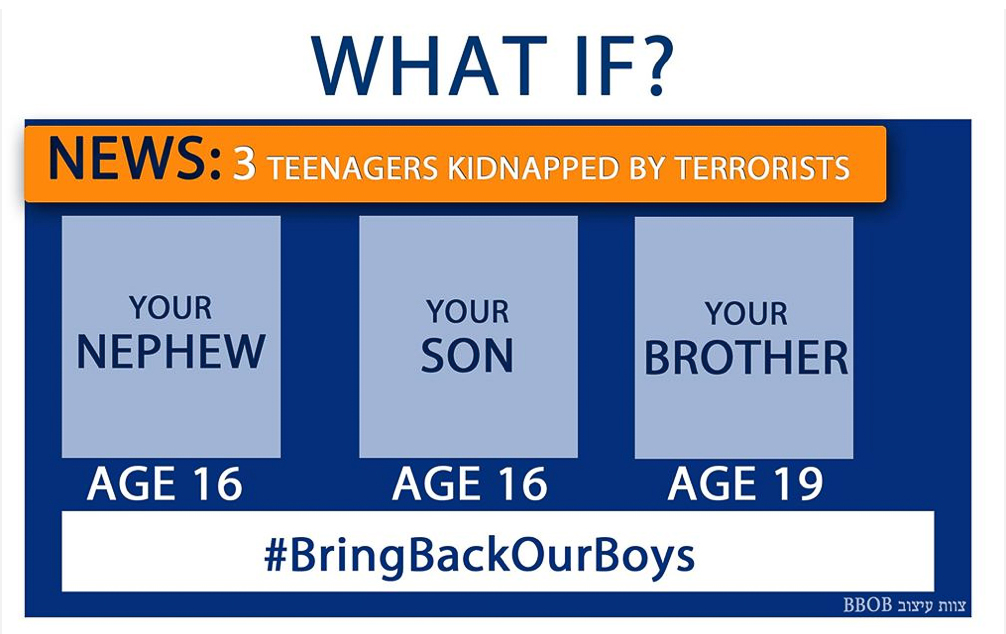
Imagine it was your kid who phoned 6 days ago. Imagine what you’d be feeling today, knowing he’s in the hands of merciless terrorists, or worse. I’m usually a very positive person, with an optimistic outlook on life and a constant desire to make the most of what we have. But as I look at my own three kids, who are 12, 10 and 7 and home safely with me, I wonder how Naftali, Gilad and Eyal’s parents must be feeling.
Premised on the #BringBackOurGirls campaign to raise awareness for the kidnapping of the Nigerian girls, a campaign to #BringBackOurBoys has also exploded online. But only in Israeli and Jewish circles, and hardly in traditional global media sources. Because everyone else is looking at this and just moving on.
If you’re a mother, and you understand how it feels to love your child, and if you believe that children, more than anyone, are innocent until proven guilty, you can’t and shouldn’t remain indifferent to this incident. If you have a 16 or 19 year old kid, hug them tonight, and if these words resonate with you, snap a quick selfie together and help the world #BringBackOurBoys .
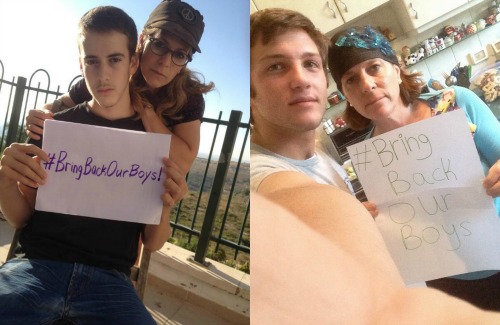 Photo Credit: Maya Ben-David & Avner Seliger
Photo Credit: Maya Ben-David & Avner Seliger
This was an original guest post for World Moms Blog by Joanna Landau.
Joanna Landau is the mother of 3 as well as the Founder & Executive Director of Kinetis, a non profit social startup promoting Israel as a hub of creativity and innovation. Kinetis brings leading bloggers from around the world to Israel to experience it for themselves. In addition, Kinetis operates educational programs in Israeli schools, the Army and Universities that aim to reignite national pride.
Susie Newday is a happily-married American-born Israeli mother of five. She is an oncology nurse, blogger and avid amateur photographer.
Most importantly, Susie is a happily married mother of five amazing kids from age 8-24 and soon to be a mother in law. (Which also makes her a chef, maid, tutor, chauffeur, launderer...) Susie's blog, New Day, New Lesson, is her attempt to help others and herself view the lessons life hands all of us in a positive light. She will also be the first to admit that blogging is great free therapy as well. Susie's hope for the world? Increasing kindness, tolerance and love.
You can also follow her Facebook page New Day, New Lesson where she posts her unique photos with quotes as well as gift ideas.
More Posts - Website
Follow Me:






 Early in the evening, we heard that he was not doing well. Then again, as is the way here, we had been hearing a great many things since the king had entered the hospital. Although Riyadh, the capital city of Saudi, has a population of four million, it still functions like a little neighborhood. Everyone has a ‘reliable source’ on the inside. As a rule, I do not believe anything until it is officially on the news–and even then, I take it with a grain of salt. Nonetheless, it was hardly a surprise when, at 2:00 AM, Saudi Arabian television announced the death of King Abdullah bin Abdulaziz Al-Saud at the age of 90. Even though I expected the news, it broke my heart.
Early in the evening, we heard that he was not doing well. Then again, as is the way here, we had been hearing a great many things since the king had entered the hospital. Although Riyadh, the capital city of Saudi, has a population of four million, it still functions like a little neighborhood. Everyone has a ‘reliable source’ on the inside. As a rule, I do not believe anything until it is officially on the news–and even then, I take it with a grain of salt. Nonetheless, it was hardly a surprise when, at 2:00 AM, Saudi Arabian television announced the death of King Abdullah bin Abdulaziz Al-Saud at the age of 90. Even though I expected the news, it broke my heart.




















